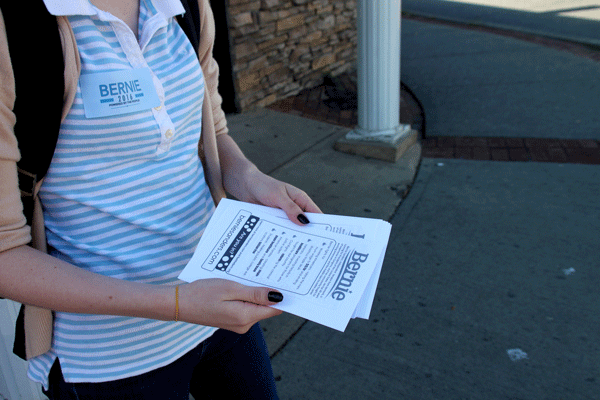
Members of New York for Bernie Sanders as well as New Paltz residents gathered in front of Elting Memorial Library on Sunday for a leafletting event with intentions to raise awareness about the presidential candidate.
The event, “Berning New Paltz,” was organized by Jacob Weinstein, 13, a resident of the town of New Paltz. The group handed out leaflets to those walking through town informing them of Sanders’ platform, beliefs and history as a United States Senator and grassroots activist.
The leaflet outlined Sanders’ fight for working Americans and raising the minimum wage to $15 per hour as well as “ending disastrous trade deals,” helping veterans invest in healthcare programs, reforming the criminal justice system in terms of civil rights, creating single-payer healthcare and family leave for American families and making public college educations tuition-free.
Also outlined in the pamphlet is Sanders’ voting record, which includes his votes against the Keystone XL Pipeline, a controversial oil pipeline that would have transported crude oil from Alberta (a province of Canada) to Nebraska, the PATRIOT Act, a bill signed into law in 2001 that allowed law enforcement to tap phones and track Internet use of Americans, banning gay adoptions in the District of Columbia and both Iraq wars. Sanders also co-sponsored legislations such as the post-9/11 GI Bill and the bipartisan Veterans Access, Choice, and Accountability Act.
Weinstein said that he believes New Paltz was a good place to reach people about Sanders because of its fairly liberal nature. He said that this event was a good opportunity to reach other New Paltz residents who aren’t convinced about the senator yet.
“If voters are informed, I think that they’ll make a better choice [during election season] and they won’t feel as disenfranchised,” he said. “New York for Sanders hopes to get his name out there since, right now, depending on the demographic, 20 to 40 percent of voters don’t know who he is.”
Bill Weinstein, Jacob’s father, agreed with his son and said that he feels Sanders has “correctly analyzed the woes afflicting our country,” and has addressed issues that directly affect New Paltz.
“The nation’s financial difficulties affect everyone in New Paltz,” he said. “The ordinary person doesn’t want or need welfare, the ordinary person wants jobs, and corporations are sitting on a trillion or more dollars of money that they could invest in putting people to work and they don’t. That’s all people want, they just want to work. Bernie gets [this] and he wants to address it.”
Despite what the Weinsteins consider to be a promising platform, they still believe that Sanders will face some challenges throughout the presidential race.
Bill predicts thatSanders may face skepticism as someone who isn’t a member of either the Democratic or Republican parties in addition to whatever negative advertising his competitors will create against him.
“Sanders has always worked cooperatively or collaboratively with Democrats although he has labeled himself something different, I think because he feels he is different,” he said. “He faces the obstacle that in this country, to be labeled as or to consider yourself a socialist, is to marginalize yourself.”
New York for Sanders believes that the candidate understands the issues facing ordinary working families and the environment, and though he is up against the “powerful forces” of million-dollar donations by the 1 percent to opposing campaigns, he continues to send a clear message: “Enough is enough. The billionaire class can not have it all.”
“Changing the culture, changing the agenda of our government is always a matter of raising consciousness,” Bill said. “People need to know about the enthusiasm of Bernie’s supporters and why they should listen to him with an open mind.”
Jacob Weinstein said that New York for Sanders has also held leafletting events in Manhattan, Washington, D.C., Detroit, Ithaca, Buffalo and Minneapolis.
The leaflet closed with a quote by Sanders addressing the 40-year decline of the middle class and “the growing gap between the very rich and everyone else.” It also addresses whether we should “fight for a progressive economic agenda that creates jobs, raises wages, protects the environment and provides healthcare for all,” whether we are prepared to take on the “enormous economic and political power of the billionaire class, or do we continue to slide into economic and political oligarchy?”
“These are the most important questions of our time,” Sanders’ quote reads. “And how we answer them will determine the future of our country.”
